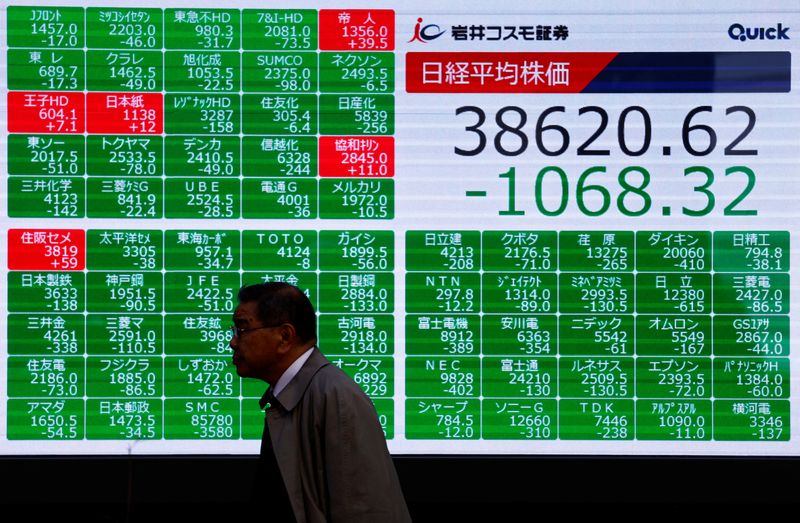By Junko Fujita
TOKYO (Reuters) - Japan's Nikkei share average will rise 4.6% by year end, supported by a firm corporate outlook and a solid global economy, according to equity market strategists in a Reuters poll.
The Nikkei is forecast to trade at 40,750 at the end of this year, according to the median estimate of 16 analysts polled May 13-21, up from Tuesday's close of 38,946.93.
Gains have been capped recently as local companies issued modest earnings forecasts at the peak of earnings season this month.
The index has been hovering below 40,000 since the beginning of April after hitting a record intraday high of 41,087.75 on March 22.
"Many Japanese companies made conservative annual forecasts but they are expected to raise their outlook toward the end of the year, which will lift the Nikkei," said Tomochika Kitaoka, chief equity strategist at Nomura Securities.
"And expectations for further progress in corporate governance reform will also push up share prices," he said.
Share buybacks and unwinding cross-shareholders driven by the governance change were behind the index's rally. The Nikkei has risen 16.4% so far this year, following a 28.2% gain in 2023.
"The U.S. economy is strong and will remain strong even if (Donald) Trump wins the presidential election," said Yugo Tsuboi, chief equity strategist at Daiwa Securities, who expects the Nikkei to be at 43,000 at the end of the year.
An upturn in the global economy will help the Nikkei to hit 44,000 before retreating to 40,500 at the end of the year, said Hikaru Yasuda, chief equity strategist at SMBC Nikko Securities.
Uncertainties about the yen's move against the dollar has also hurt sentiment the Japanese stock market, but some strategists said the negative impact of the currency's possible gain against the dollar will be limited.
The yen fell to a 34-year low of 160.245 per dollar late last month, before rebounding sharply in what traders and analysts suspected was several rounds of yen-buying intervention by Japanese authorities.
"If the yen strengthens, foreign investors may sell the Nikkei. But I expect the Nikkei to be at 40,000 at the end of this year even as the yen rises to 142 yen to the dollar because earnings of Japanese companies are on the rise," said Masayuki Kubota, chief strategist at Rakuten Securities.
Strategists also said the Nikkei is unlikely to correct 10% or more in the coming three months.

"There are some potential risks, such as a deterioration of the U.S. economy and the chip boom, as well as tensions in the Middle East, but unless these things occur, the Nikkei is unlikely to fall below 35,000," said Shingo Ide, chief equity strategist at NLI Research Institute.
(Other stories from the Reuters Q2 global stock markets poll package:)